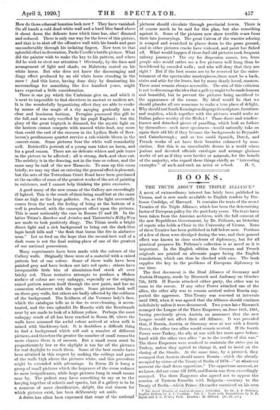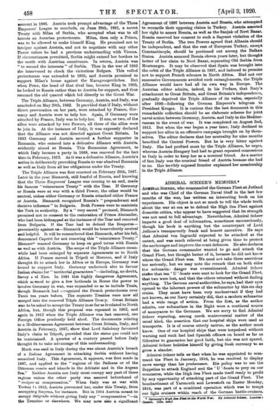BOOKS.
THE TRUTH ABOUT THE TRIPLE ALLIANCE.* A nowt of extraordinary interest has lately been published in Vienna, and is now made available to English readers by Pro- fessor Coolidge, of Harvard. It contains the texts of the secret Treaties of the Triple Alliance, which has boon the determining factor of European policy for the past forty years. The texts have been taken from the Austrian archives, with the full consent of the new Republican Government, by Dr. Pribram, an historian of repute who holds a Chair in the University of Vienna. None of these Treaties has been published in full before now. Portions of a few of them ware divulged during the war, and their general effect was known to close students of diplomacy, but for all practical purposes Dr. Pribram's collection is as novel as it is important. In the English edition the German and French originals are printed on alternate pages facing the English translations, which can thus ho checked with ease. The book supplies the key to the problems of European diplomacy in our time.
The first document is the Dual Alliance of Germany and Austria-Hungary, made by Bismarck and Andrassy on October 7th, 1879. If Russia attacked either party, the other was to come to the rescue. If any other Power attacked one of the allies, the other ally was to remain neutral unless Russia sup- ported the aggressor. This Treaty was renewed at intervals until 1902, when it was agreed that the Alliance should continue indefinitely unless it were denounced. Two years later Bismarck arranged the League of the Three Emperors, on June 18th, 1881, having previously given Austria an assurance that the new League would not affect their old Alliance. It was provided that, if Russia, Austria, or Germany wore at war with a fourth Power, the other two allies would remain neutral. If the fourth Power were Turkey, the ally at war with her must agree before- hand with the other two allies "as to the results of this war." Tho three Emperors were resolved to maintain the status quo in Turkey, unless they agreed to change it, and to insist on the closing of the Straits. At the same time, by a protocol, they arranged that Austria should annex Bosnia—which she already occupied by virtue of the Treaty of Berlin of 1878—" at whatever moment she shall deem opportune." The opportune moment, as we know, did not come till 1908, and Russia was then exceedingly annoyed. The three Emperors also agreed not to oppose the reunion of Eastern Rumelia with Bulgaria—contrary to the Treaty of Berlin—which Prince Alexander contrived on his own
• The Secret Treaties of Auelria-Iltingara, 1879-1914. By Dr. A. F. Pribram. English Edition by A. C. Coolidge. Vol. 1.: Texts with Translations by D. P. Myers and J. a. D'Arcy Paul. London : H. Milford. L8s. Oil. mid
account in 1885. Austria took prompt advantage of the Three Emperors' League to conclude, on June 28th, 1881, a secret Treaty with Milan of Serbia, who accepted what was to all
Intents; an Austrian protectorate. Milan, then only a Prince, was to be allowed to make himself King. He promised not to
Intrigue against Austria, and not to negotiate with any other Power unless he had a previous understanding with Vienna. If circumstances permitted, Serbia might extend her borders to the south with Austrian connivance. In return, Austria was "to second the interests" of Serbia. Thus in the war of 1885 the intervened to check the victorious Bulgars. This veiled protectorate was extended to 1895, and Austria promised to support Milan's house against the Karageorgevitches. But when Peter, the head of that rival line, became King in 1903, he looked to Russia rather than to Austria for support, and thus resumed the old quarrel which led directly to the Great War.
The Triple Alliance, between Germany, Austria, and Italy, was concluded on May 20th, 1882. It provided that if Italy, without direct provocation on her part, were attacked by France, Ger- many and Austria were to help her. Again, if Germany were attacked by France, Italy was to help her. If one, or two, of the allies were attacked by two Powers, all three of the allies were to join in. At the instance of Italy, it was expressly declared that the Alliance was not directed against Great Britain. In 1883 Germany and Austria secured a further supporter in Rumania, who entered into a defensive Alliance with Austria. evidently aimed at Russia. This Rumanian Agreement, to which Italy became a party in 1888, was renewed for the last time in February, 1913. As it was a defensive Alliance, Austria's motion in deliberately provoking Russia to war absolved Rumania as well as Italy from all her obligations under the Treaty.
The Triple Alliance was first renewed on February 20th, 1887. Later in the year Bismarck, still fearful of Russia, and knowing
that the Three Emperors' League was coming to an end, made his famous "reinsurance Treaty" with the Tsar. If Germany or Russia were at war with a third Power, the other would be neutral, unless either Germany or Russia attacked either France or Austria. Bismarck recognized Russia's "preponderant and decisive influence" in Bulgaria. Both Powers were to maintain the Turk in authority. By a "very secret" protocol, Bismarck promised not to consent to the restoration of Prince Alexander, who had been kidnapped at the instance of the Tsar and removed from Bulgaria. If the Tsar had to defend the Boaporus- presumably against us—Bismarck would be benevolently neutral and helpful. It will be remembered that Bismarck, after his fall, denounced Caprivi for not renewing this "reinsurance Treaty." Bismarca- wanted Germany to keep on good terms with Russia as well as with Austria. The scope of the Triple Alliance mean- while had been enlarged by separate Agreements as to North Africa. If Franc* moved in Tripoli or Morocco, and if Italy thought fit to attack her in Africa or in Europe, Germany was bound to support Italy. Germany undertook also to favour Italian &alms for " territorial guarantees "—including, no doubt, Savoy a -d Nice. In 1891 this highly dangerous Agreement, which seamed to give a few hotheads in Rome the power to Involve Germany in war, was expanded so as to include Tunis, though Bismarck had recognized the French protectorate over Tunis ten years before. The separate Treaties were now all merged into the renewed Triple Alliance Treaty. Great Britain was to be asked to accept the Treaty in so far aa it related to North Africa, but, though this proposal was repeated in 1902, and again in 1912 when the Triple Alliance was last renewed, our Foreign Office prudently held aloof. The documents relating to a Mediterranean Agreement between Great Britain, Italy, and Austria in February, 1887, show that Lord Salisbury favoured Italy's claim to Tripoli, provided that the status quo could not be maintained. A quarter of a century passed before Italy thought lit to take advantage of this understanding.
Much was said in Italy during the war about Austria's breach of a Balkan Agreement in attacking Serbia without having %insulted Italy. This Agreement, it appears, was first made in 1887, and applied to the "regions of the Balkans or of the Ottoman coasts and islands in the Adriatic and in the Aegean Bea." Neither Austria nor Italy must occupy any part of these regions unless the other party was assured beforehand of " reciprocal oompensation." When Italy was at war with Turkey 11 1912, Austria prevented her, under this Treaty, from occupying Smyrna, for instance. But in 1914 Austria meant to occupy Belgrade without giving Italy any "compensation "—in the Trentino or elsewhere. We may note also a significant
Agreement of 1897 between Austria and Russia, who attempted to reconcile their opposing claims in Turkey. Austria asserted her right to annex Bosnia, as well as the Sanjak of Novi Bazar. Russia reserved her consent to such a flagrant violation of the Treaty of Berlin. The two Powers agreed that Albania should be independent, and that the rest of European Turkey, except Constantinople, should be portioned out among the Balkan States. Austria annexed Bosnia eleven years later, but thought better of her claim to Novi Bazar, separating Old Serbia from Montenegro. It may be observed that Spain was brought into the orbit of the Triple Alliance in 1887, and induced to promise not to support French schemes in North Africa. Had not our successive Governments avoided such entanglements, the Triple Affiance would have had all it own way in Europe. The Austrian editor admits, indeed, in his Preface, that Italy's attachment to Great Britain, and Great Britain's independence, gradually deprived the Triple Affiance of its value, especially after 1896—following the German Emperor's telegram to President Kruger. It is curious that the last document in this remarkable collection should be an elaborate scheme for joint naval action between Germany, Austria, and Italy in the Mediter- ranean in the event of war. It was completed on August 2nd, 1913. But when the war began a year later, Italy declined to support her allies in an offensive campaign brought on by them- selves. The editor declares that her neutrality for nine months benefited the Central Powers. But he is very bitter against Italy. She had profited most by the Triple Alliance, he urges, whereas Austria-Hungary had had to grant repeated concessions to Italy in order to keep her as a nominal friend. As a matter of fact Italy was the nominal friend of Austria because she had to be. Her terribly exposed frontier explained her membership in the Triple Alliance.



































 Previous page
Previous page